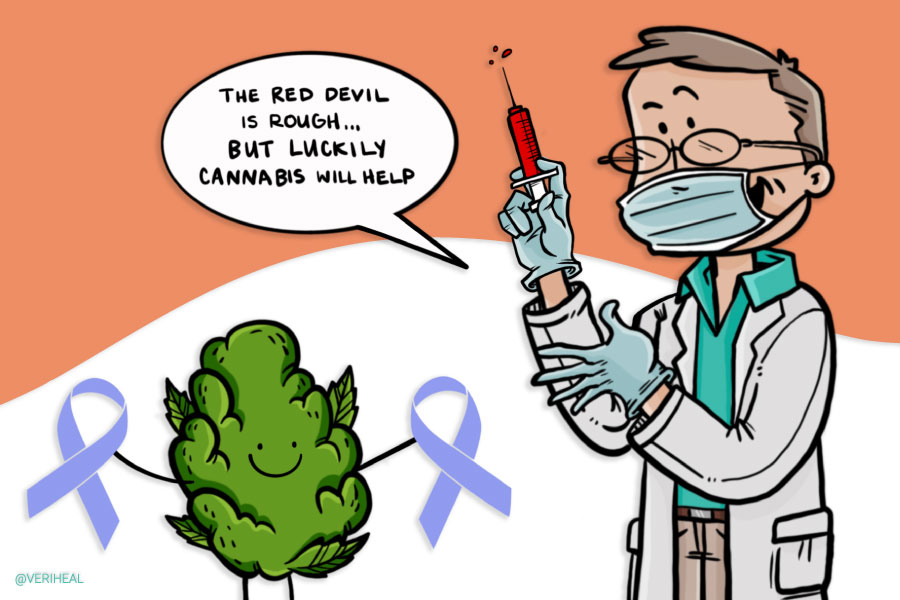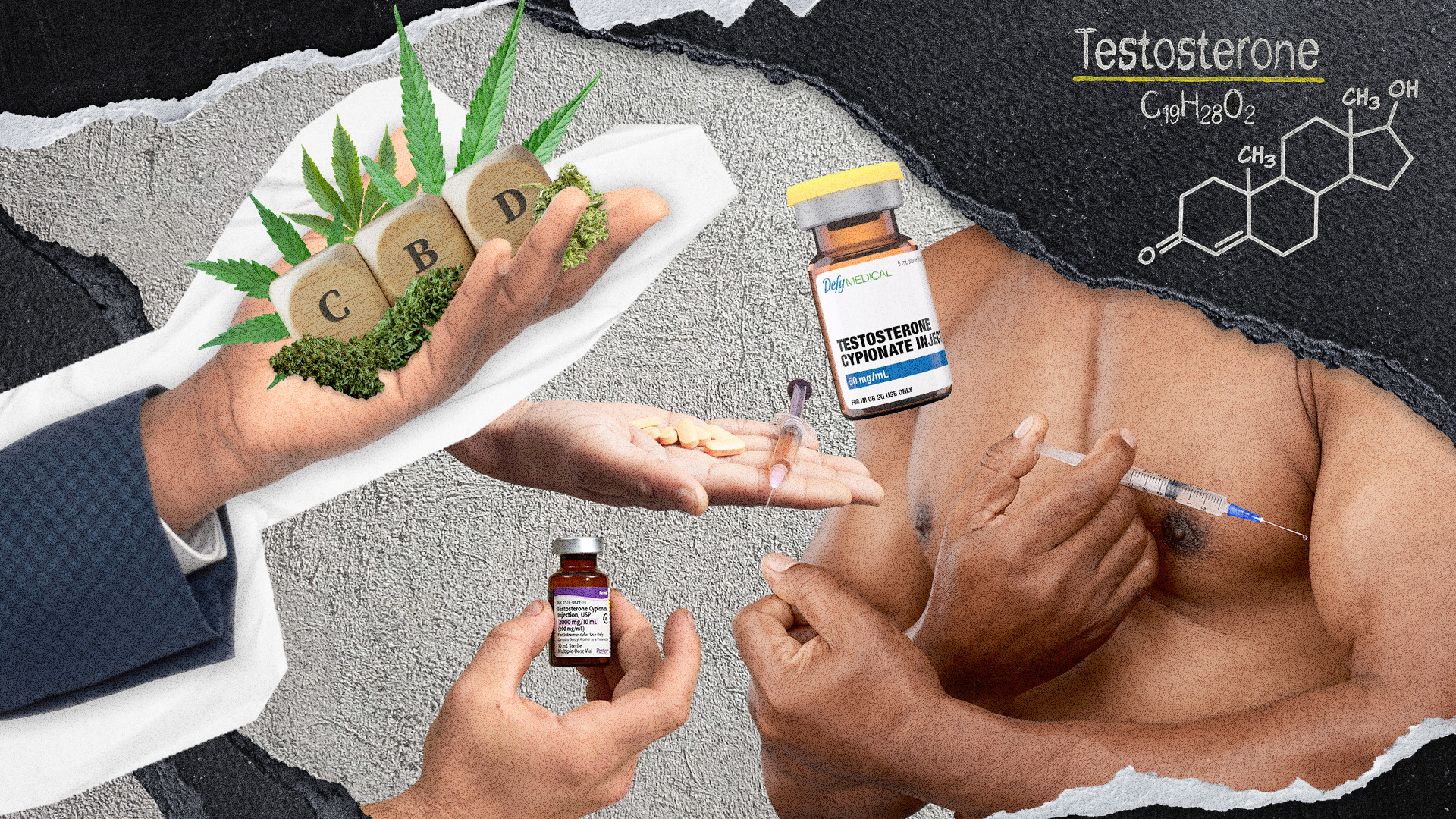Cancer patients around the world get treated with powerful medication and therapy, which is accompanied by a host of adverse side effects which reduces the quality of life, more so than cancer alone. Cancer patients tend to get worse before better due to the side-effects of treatment. Patients then get administered additional medication in order to treat those side-effects. That makes a large number of pharmaceutical medications pumping through their symptoms. Now, research has revealed promising evidence that cannabis can be effective for treating those symptoms, essentially reducing the number of required pharmaceuticals.
What is Chemotherapy?
Chemotherapy has become notorious for its powerful chemicals that kill fast-growing cells in the body. The treatment is an aggressive form of chemical drug therapy and it is available in different varieties, which can be used on their own or in combination (with other forms of chemotherapy or other treatments such as radiation and surgery). Chemotherapy is used to kill troublesome cells, like the cancerous ones which multiple faster than our body’s normal cells. Chemotherapy is most likely being administered in order to (a) reduce the total number of cancerous cells, (b) prevent cancerous cells from spreading, (c) reduce tumor size, and (d) alleviate current symptoms.
The variety of chemotherapy that will be administered to a cancer patient depends on the type and stage of cancer, overall health, cancer, and treatment history as well as on the goals and preferences.
The treatment can be administered as pills, shots, creams, infusions (drip into veins) as well as directly to one area of the body. When chemotherapy is administered to one area of the body it is directly given to the abdomen (intraperitoneal chemotherapy), chest cavity (intrapleural chemotherapy), through the urethra into the bladder (intrathecal chemotherapy) or central nervous system (intrathecal chemotherapy).
What is Chemotherapy Administered for?
According to the Mayo Clinic, the following settings are reasons why chemotherapy is administered.
- To treat cancer without other treatments.
- To kill hidden cancer cells after other treatments.
- To prepare individuals for other treatments.
- To alleviate signs and symptoms.
Chemotherapy is commonly used as a treatment for cancer but it can also be used to prepare individuals with bone marrow diseases for stem cell transplant as well as controlling overactive immune systems in conditions such as lupus.
Why You Should Get Your Medical Marijuana Card
Veriheal has satisfied millions of patients nationwide by giving them access to these benefits
- Larger purchase limits
- Peace of mind
- Enhanced legal protection
- Access to higher potency strains
- Save up to 25% on cannabis purchases
- Skip the line at the dispensary
What are the Side Effects of Chemotherapy?
Just as chemotherapy has become notorious for its power, so has it gained a reputation for the adverse side-effects which could be experienced by the patients. Each chemotherapy drug has different side effects due to the different strengths as well as how it is administered.
Common side effects: nausea, vomiting, diarrhea, hair loss, loss of appetite, fatigue, fever, mouth sores, pain, constipation, easy bruising, bleeding, and in personal experience, pale complexion. These side effects can usually be prevented or treated and they usually go away after the patient stops taking the treatment.
Long-lasting or/and late-developing side effects: damage to lung tissue, heart problems, infertility, kidney problems, nerve damage, and the risk of returning cancer.
The Study by Researchers at Australia’s Chris O’Brien Lifehouse
A research team at Australia’s Chris O’Brien Lifehouse, a world-class non-profitable cancer treatment center and full operational cancer hospital, found that cannabis is effective for alleviating side effects associated with taking chemotherapy as well as that cancer patients prefer medical cannabis over pharmaceutical medication for the treating symptoms.
The study involved 80 patients at the treatment center and hospital, where they administered cannabis capsules or a placebo since the study is a placebo-controlled trial. The team organized the study to ensure that it yields high-quality evidence that accurately reflects the effectiveness of cannabis for cancer patients. It was explained that cannabis is being considered due to the fact that so many cancer patients suffer from vomiting and nausea despite taking the best anti-nausea and vomiting medications. The cannabis capsules administered to the participants in the study contained equal amounts of cannabis cannabinoids known as tetrahydrocannabinol (THC) and cannabidiol (CBD). THC is commonly associated with the intoxicating effects of cannabis but despite that, Dr. Peter Grimison, a medical oncologist, explained that “More than four in five patients said they preferred having cannabis despite some side-effects because they had better control of nausea and vomiting”.
The team of researchers is now only halfway through recruiting patients at cancer centers. However, one of the participants, Harry Freeman, took the cannabis capsules during his final rounds of chemotherapy for testicular cancer and reported that the capsules made him feel more tired but that he could tolerate the treatment much better.
Other Supportive Studies
- A study published by the Minnesota Department of Health found that cancer patients enrolled in a state medical cannabis program reported a significant reduction in symptoms and their severity, which also included a 50% reduction in vomiting.
- A study published by the European Journal of Internal Medication discovered that 96% of the cancer patients reported improvements in their condition through the use of cannabis, which includes a reduction in nausea.
- A study published by Therapeutic Advances in Medical Oncology determined that cannabis offers many benefits as a “supportive and palliative” care for cancer patients. The study also found that cannabis can treat chemotherapy-induced nausea, vomiting, loss of appetite, pain, and chemotherapy-induced peripheral neuropathy.
As the research portrays, cannabis provides promise and hope for alleviating chemotherapy side-effects, especially in terms of nausea, vomiting, pain, and boosts the patient’s ability to better handle the chemotherapy. Most of the studies concluded by stating that more precise research needs to be done, but fortunately, there is plenty of anecdotal evidence available and ever-increasing availability of research. If you have any experience with consuming cannabis to help with cancer and chemotherapy symptoms, let us know in the comment section below.
Author, Share & Comments
















